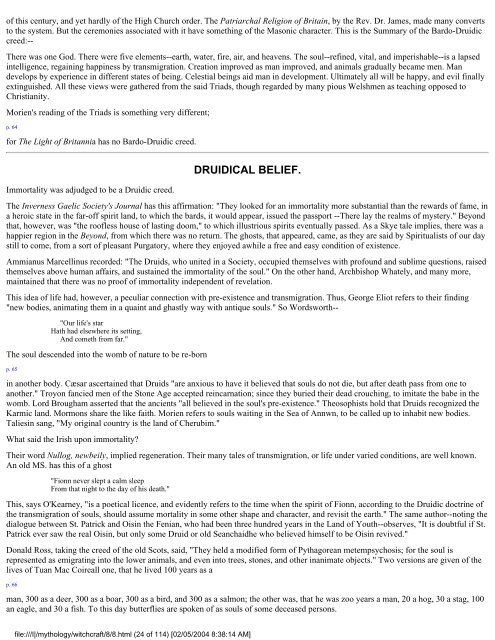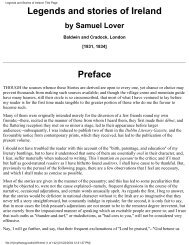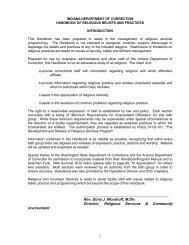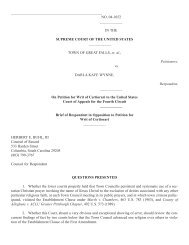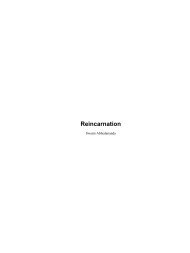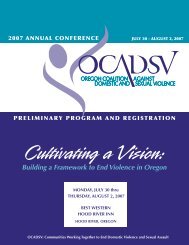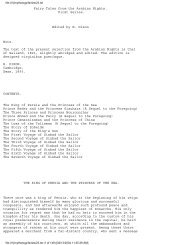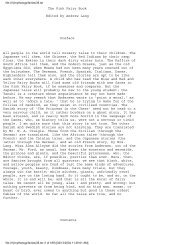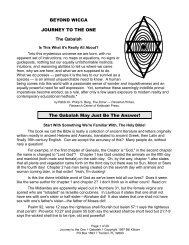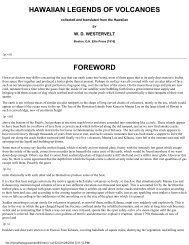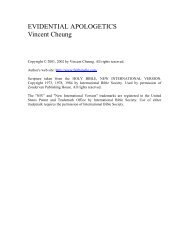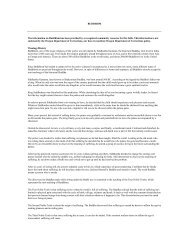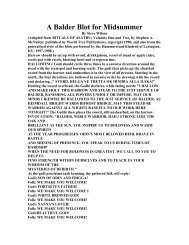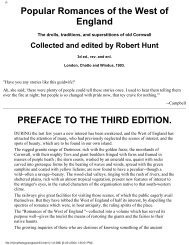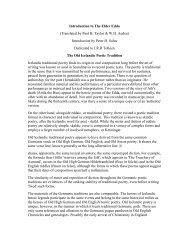Irish Druids And Old Irish Religions PREFACE CONTENTS
Irish Druids And Old Irish Religions PREFACE CONTENTS
Irish Druids And Old Irish Religions PREFACE CONTENTS
You also want an ePaper? Increase the reach of your titles
YUMPU automatically turns print PDFs into web optimized ePapers that Google loves.
of this century, and yet hardly of the High Church order. The Patriarchal Religion of Britain, by the Rev. Dr. James, made many converts<br />
to the system. But the ceremonies associated with it have something of the Masonic character. This is the Summary of the Bardo-Druidic<br />
creed:--<br />
There was one God. There were five elements--earth, water, fire, air, and heavens. The soul--refined, vital, and imperishable--is a lapsed<br />
intelligence, regaining happiness by transmigration. Creation improved as man improved, and animals gradually became men. Man<br />
develops by experience in different states of being. Celestial beings aid man in development. Ultimately all will be happy, and evil finally<br />
extinguished. All these views were gathered from the said Triads, though regarded by many pious Welshmen as teaching opposed to<br />
Christianity.<br />
Morien's reading of the Triads is something very different;<br />
p. 64<br />
for The Light of Britannia has no Bardo-Druidic creed.<br />
Immortality was adjudged to be a Druidic creed.<br />
DRUIDICAL BELIEF.<br />
The Inverness Gaelic Society's Journal has this affirmation: "They looked for an immortality more substantial than the rewards of fame, in<br />
a heroic state in the far-off spirit land, to which the bards, it would appear, issued the passport --There lay the realms of mystery." Beyond<br />
that, however, was "the roofless house of lasting doom," to which illustrious spirits eventually passed. As a Skye tale implies, there was a<br />
happier region in the Beyond, from which there was no return. The ghosts, that appeared, came, as they are said by Spiritualists of our day<br />
still to come, from a sort of pleasant Purgatory, where they enjoyed awhile a free and easy condition of existence.<br />
Ammianus Marcellinus recorded: "The <strong>Druids</strong>, who united in a Society, occupied themselves with profound and sublime questions, raised<br />
themselves above human affairs, and sustained the immortality of the soul." On the other hand, Archbishop Whately, and many more,<br />
maintained that there was no proof of immortality independent of revelation.<br />
This idea of life had, however, a peculiar connection with pre-existence and transmigration. Thus, George Eliot refers to their finding<br />
"new bodies, animating them in a quaint and ghastly way with antique souls." So Wordsworth--<br />
"Our life's star<br />
Hath had elsewhere its setting,<br />
<strong>And</strong> cometh from far."<br />
The soul descended into the womb of nature to be re-born<br />
p. 65<br />
in another body. Cæsar ascertained that <strong>Druids</strong> "are anxious to have it believed that souls do not die, but after death pass from one to<br />
another." Troyon fancied men of the Stone Age accepted reincarnation; since they buried their dead crouching, to imitate the babe in the<br />
womb. Lord Brougham asserted that the ancients "all believed in the soul's pre-existence." Theosophists hold that <strong>Druids</strong> recognized the<br />
Karmic land. Mormons share the like faith. Morien refers to souls waiting in the Sea of Annwn, to be called up to inhabit new bodies.<br />
Taliesin sang, "My original country is the land of Cherubim."<br />
What said the <strong>Irish</strong> upon immortality?<br />
Their word Nullog, newbeily, implied regeneration. Their many tales of transmigration, or life under varied conditions, are well known.<br />
An old MS. has this of a ghost<br />
"Fionn never slept a calm sleep<br />
From that night to the day of his death."<br />
This, says O'Kearney, "is a poetical licence, and evidently refers to the time when the spirit of Fionn, according to the Druidic doctrine of<br />
the transmigration of souls, should assume mortality in some other shape and character, and revisit the earth." The same author--noting the<br />
dialogue between St. Patrick and Oisin the Fenian, who had been three hundred years in the Land of Youth--observes, "It is doubtful if St.<br />
Patrick ever saw the real Oisin, but only some Druid or old Seanchaidhe who believed himself to be Oisin revived."<br />
Donald Ross, taking the creed of the old Scots, said, "They held a modified form of Pythagorean metempsychosis; for the soul is<br />
represented as emigrating into the lower animals, and even into trees, stones, and other inanimate objects." Two versions are given of the<br />
lives of Tuan Mac Coireall one, that he lived 100 years as a<br />
p. 66<br />
man, 300 as a deer, 300 as a boar, 300 as a bird, and 300 as a salmon; the other was, that he was zoo years a man, 20 a hog, 30 a stag, 100<br />
an eagle, and 30 a fish. To this day butterflies are spoken of as souls of some deceased persons.<br />
file:///I|/mythology/witchcraft/8/8.html (24 of 114) [02/05/2004 8:38:14 AM]


